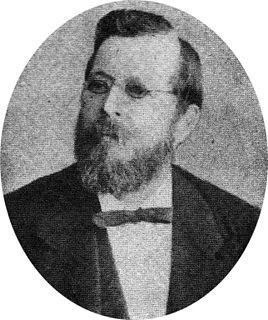Igreja Presbiteriana de Moçambique is one of the largest Protestant denominations of Mozambique.

The World Communion of Reformed Churches (WCRC) is the largest association of Calvinist churches in the world. It has 230 member denominations in 108 countries, together claiming an estimated 80 million people, thus being the fourth-largest Christian communion in the world after the Catholic Church, Eastern Orthodox Church, and the Anglican Communion. This ecumenical Christian body was formed in June 2010 by the union of the World Alliance of Reformed Churches (WARC) and the Reformed Ecumenical Council (REC).

The Presbyterian Church of Brazil is an Evangelical Protestant Christian denomination in Brazil. Oldest of the Reformed family of Protestantism in Brazil. It is the largest Presbyterian denomination in the country, having an estimate 649,510 members, 4,475 ordained ministers and 5,068 churches and parishes. It is also the only Presbyterian denomination in Brazil present in all 26 States and the Federal District. It was founded by the American missionary Rev. Ashbel Green Simonton, who also oversaw the formal organization of the first congregation and the first Presbytery. Although the Presbyterian Church of Rio de Janeiro was only formally organized in January 1863, and the Brazilian church only left the jurisdiction of the joint missions board of the American churches in 1888, when the Synod was formed, the denomination considers the date of Simonton's arrival in Brazil, August 12, 1859, as its foundation date.

The Independent Presbyterian Church of Brazil is a Mainline Protestant Christian denomination in Brazil. Part of the Reformed family of Protestantism, it is the second oldest Presbyterian denomination in the country, had an estimated 74.224 members, 693 ordained ministers and 510 churches in 2009. In 2012 the church had more than 85,000 members and 546 congregations. It was founded by Brazilian minister Rev. Eduardo Carlos Pereira and a group of six other ministers and their churches, who split from the Presbyterian Church of Brazil over a number of political and ecclesiastical controversies.

The National Presbyterian Church in Mexico is the second-largest Protestant church, and the largest Reformed denomination in Mexico. It is present throughout the country, and is particularly strong in the states of Tabasco, Chiapas, Campeche, Yucatan, Nuevo León, Aguascalientes and Mexico City.
The Evangelical Presbyterian and Reformed Church in Peru was established by missionaries from the Free Church of Scotland. In 1915, San Andres College was founded by John A, Mackay. Medical work was centered in Moyobamba and Cajamarca. The first church work was started in 1921. The first church was built in Cajamarca in 1936 with 600 people present. The work spread to Tarapoto and Chachapoyas. But there was shortage of pastors and elders. The first General Assembly was held in 1963 with 5 presbyteries namely the Amazonas, Cajamarca, Lima, Celendin and San Martin, and the church become independent. The name of the denomination was Evangelical Presbyterian Church of Peru. The church had 3,000 members.
The Renewed Presbyterian Church in Brazil is Presbyterian Pentecostal denomination in Brazil.
The Igreja Presbiteriana Conservadora do Brasil (IPCB) is a Presbyterian Reformed denomination, founded in 1940, by the churches and members that separated from the Independent Presbyterian Church of Brazil (IPIB). The main reason for the split was the decision of the IPIB General Assembly, in 1938, to appoint a commission to draw up a new confession of faith. This confession would replace the Westminster Confession of Faith and be tolerant of annihilationism. The members who opposed this split and formed the IPCB. It is currently the third largest reformed denomination in Brazil, right after the Presbyterian Church of Brazil (IPB) and a IPIB, preserving traditional positions of Presbyterianism.
The Evangelical Reformed Church in Angola is a Reformed denomination in the country of Angola established by the missionaries of the Swiss Reformed church.
The Fundamentalist Presbyterian Church in Brazil was founded in 1956 in northeastern part of Brazil under the leadership of Rev. Dr. Israel Gueiros. A schism occurred in the Presbyterian Church of Brazil, because of the inspiration of the Bible and other doctrinal issues. Today the church has 5 presbytery and the denomination are about to form a Synod. Has its own journal and started evangelical projects. The church has 1,800–2,000 members and 27 congregations.
The Presbyterian Church in Paraguay is an independent confessional Reformed Calvinist denomination in Paraguay, it was founded by Brazilian missionaries.
The Evangelical Presbyterian Church of East Timor is a Reformed Presbyterian denomination in East Timor with 14 churches and 3 chapels. It has 3,500 members and 9 pastors - 6 full-time 3 part- time pastors and 6 evangelists. The church is supported by the Presbyterian Church of Australia, and sister church relationship was also formed between these denominations. It held the foundational Synod in 2011. Contacts with the Christian Presbyterian Church in Portugal was also established and mission trip was made in East Timor on August 2012.
The Evangelical Presbyterian Church in Portugal is a result of evangelistic effort in Madeira between 1838 and 1846 by Robert Kalley, a Scottish minister, the mission continued in the continent in 1966. The first Presbyterian church was founded by Rev. Antonio de Matos, who arrived in Portugal in 1870. Matos was converted by Kalley, and studied in Scotland. Throughout the 19th and 20th century churches were planted in Madeira, Azores, Portugal. In 1926 a Presbytery was formed. In 1944 the Evangelical Presbyterian Church in Portugal was formed. In 1946 a Theological Seminary was formed in Carcavelos, but moved to Lisbon in 1970. The denomination is the oldest non-Catholic church in Portugal. It is a member of the World Communion of Reformed Churches, the Conference of European Churches and the World Council of Churches.

Rev. Alexander Latimer Blackford was an American Presbyterian missionary in Brazil born on January 9, 1829, in Martins Ferry, Ohio.
The Presbyterian Church in Guinea-Bissau is a mission of the Presbyterian Church of Brazil. It was started as a medical mission in Guinea-Bissau. Today the church has three national pastors, and a training center, the Aboundadt Life Center and the Presbyterian Church in Gabú, this is a church and also in the church is a seminary, the building was begun to construct in the Spring 2013. There are two more congregations around Gabú and a preaching station in Sintabaco around 110 km from Gabú. The worship attendance is about 700.

Lagoinha Baptist Church is a charismatic Baptist Evangelical multi-site megachurch located in Belo Horizonte, Minas Gerais in Brazil. Márcio Valadão is the current senior pastor of the church. The church became known through one of its ministries, the worship ministry Diante do Trono, which is one of the world's largest ministries of praise, worship and mission. Some of the main services are broadcast live via Internet and also via their own TV and radio station: Rede Super. It is affiliated with the Convenção Batista Nacional and Baptist World Alliance.
The Parliamentary Evangelical Front or more simply known as the Evangelical Caucus is a loosely organized group of Protestant, Evangelical, and Pentecostal lawmakers in the Brazilian government and legislature.
The Reformed Presbyterian Church of Brazil - in Portuguese Igreja Presbiteriana Reformada do Brasil - is a Presbyterian denomination founded on October 31, 2000, by Rev. Joacir Emerick Eler and former members of the Igreja Presbiteriana do Brasil, in Caratinga, Minas Gerais.
The Presbyterian Church of Grace is a denomination of orientation Pentecostal, founded on October 8, 1995, in Mogi das Cruzes, São Paulo from a group of dissident members of the Presbyterian Church of Brazil, who adhered to the Pentecostal doctrine of Baptism with the Holy Spirit as the second blessing, after conversion. Despite adopting the Presbyterian name, it has no link with the doctrine Presbyterian, nor with the Presbyterian form of government, being the Episcopalism adopted.






